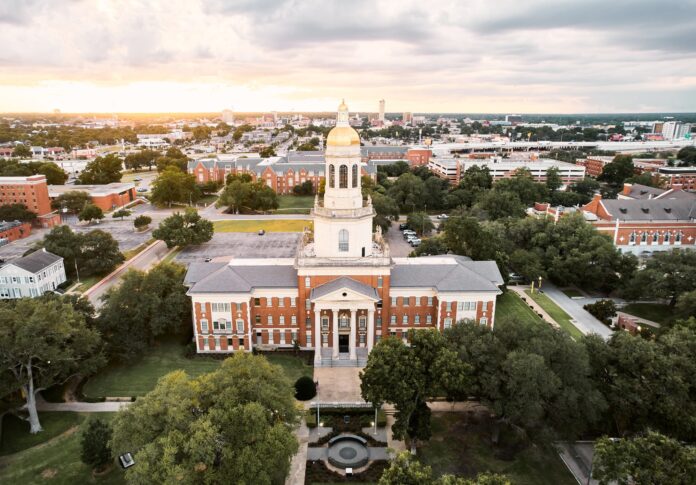
By Sydney Matthews | Assistant News Editor
In response to social media claims regarding Baylor’s religious exemptions from Title IX, President Linda Livingstone released a statement Monday clarifying that such exemptions do not impact how Baylor handles sexual harassment cases.
“There will be NO CHANGES to Baylor’s current practices or policies related to sexual harassment and other forms of sexual and interpersonal conduct resulting from this assertion of our existing religious exemptions,” the statement reads. “Our Office of Equity, Civil Rights and Title IX will continue to investigate sexual harassment allegations or related complaints and investigate these thoroughly and fairly.”
Baylor currently holds religious exemptions from Title IX of the Education Amendments of 1972, which “prohibits sex (including pregnancy, sexual orientation, and gender identity) discrimination in any education program or activity receiving federal financial assistance.”
Livingstone sent a letter to the Office for Civil Rights in May, arguing that complaints about Baylor not responding to harassment claims from LGBTQ+ students should not have standing because of the university’s religious beliefs. According to the letter, such complaints include the university’s alleged decision to not officially charter Gamma Alpha Upsilon, its alleged response to a notification that students were subjected to harassment based on sexual orientation or gender identity, and its alleged decision to pressure university media not to report on LGBTQ+ protests and events in 2021.
Further, the letter said Baylor is exempt from any requirements under Title IX about sexual orientation that contradict its Baptist doctrine because “Baylor could not be found in violation of Title IX on the ground that the belief in or practice of its religious tenets by the University or its students constitutes ‘unwelcome conduct.'”
“Since Baylor ‘affirms the biblical understanding of sexuality as a gift from God’ and requires ‘purity in singleness and fidelity in marriage between a man and a woman as the biblical norm,’ any asserted Title IX requirement that Baylor must allow sexual behavior outside of marital union between a man and a woman, or that contradicts the Baptist doctrine of marriage and the created distinction between men and women, is inconsistent with Baylor’s religious tenets, and the University is exempt from such requirement,” the letter reads.
According to the Department of Education, requests for such exemptions are required to “identify the religious organization that controls the educational institution” while clarifying the specific contradictions with its religious tenets. The DOE granted Baylor the religious exemptions after an investigation confirmed that its request met those requirements.
“Under Title IX, you can’t discriminate against certain things, and sexual orientation is among them,” Mike Hiestand, senior legal counsel of the Student Press Law Center, said. “Some of those are contradictory to the religious beliefs of a particular institution, and there is an exemption that schools can apply for. My understanding is that Baylor has applied for and has received an exemption in the past.”
Hiestand said he believes the letter sent by Livingstone to the DOE came in light of the expanded definition of Title IX under the Biden administration, which will take effect in October.
According to the DOE, the new regulations “will strengthen protections for LGBTQI+ students who face discrimination based on sexual orientation or gender identity. And they will require that school procedures for complaints of sex discrimination, including sexual violence and other sex-based harassment, are fair to all involved.”
Following the communication between Livingstone and the DOE, a thread from the Religious Exemption Accountability Act (REAP) went viral on X, previously known as Twitter. The thread discussed the letters requesting and granting the exemptions, claiming the exemptions meant Baylor would stop or modify Title IX and other protections for the LGBTQ+ community.
As a result, many students who are part of the LGBTQ+ community expressed concern about what the future holds for them at religious institutions and whether this sets a precedent for what Baylor is allowed to do.
“While private universities should be allowed to express their religion and uphold their beliefs in what is regarded as necessary for its student body and faculty, that in no way should infringe upon national laws like Title IX,” Elgin, Okla., junior and Gamma Alpha Upsilon external chair Bee Matthey, who uses they/them pronouns, said. “This exemption, whether it changes policy or not, shows a systematic lack of accountability and sets worrying precedents for future cases that deal with disagreements from any community, not just the queer community and the Baptist church. And as Livingstone says, these matters have implications for all religious-based universities, not just Baylor.”
Although they have had positive experiences with professors and fellow students during their time at Baylor, Matthey said a religious institution should go above and beyond to show support and kindness to its LGBTQ+ students since they are less likely to find it from their peers. With the exemptions, Matthey said Baylor is failing to show the LGBTQ+ community the support it needs.
“In a Baptist church community where there is a history of prejudice toward a specific group, that organization needs to go out of their way to show that community support,” Matthey said. “Having policies in place to make sure the communities that have been historically discriminated against are taken care of should be a really big priority, and it not being, is really scary for people.”
Amid such concerns, the Office of the President affirmed its commitment to fostering a caring community for all students.
“Baylor has taken and will continue to take meaningful steps to ensure members of the LGBTQ community are loved, cared for and protected as a part of the Baylor Family,” Baylor spokesperson Lori Fogleman said via email. “Further, the University remains committed to promoting and maintaining an educational environment in which students can learn and grow in accordance with our Christian mission and our call to love our neighbors as ourselves.”





